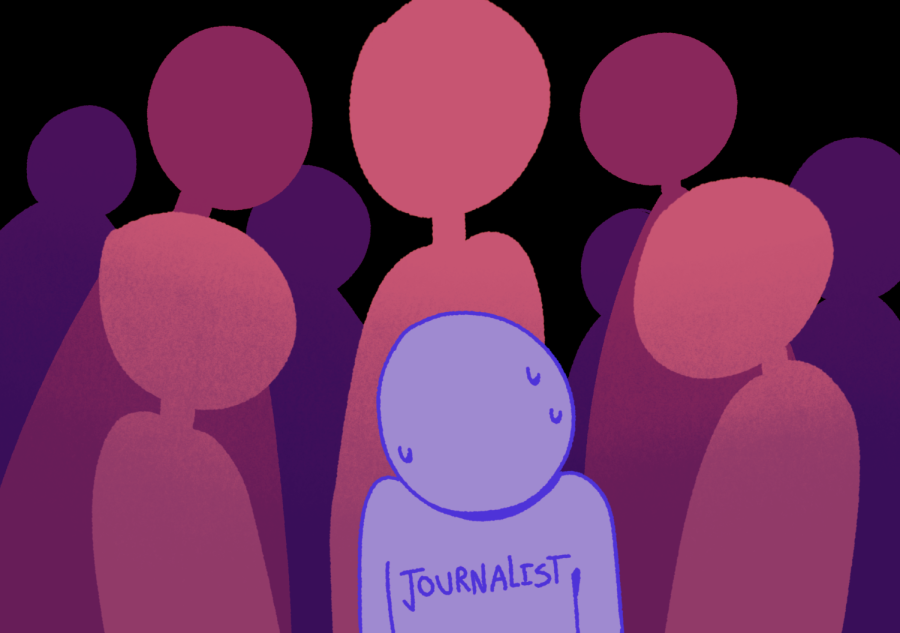Opinion | Nobody wants to be a journalist
Jan 24, 2023
While looking at the most regretted college majors poll conducted by CNBC, I immediately noticed that my major is ranked number one — 87% of journalism graduates say they would pick another major if they could go back and do college again.
I was curious as to why. Maybe because of the long, unpredictable hours? Maybe because of the pay? After all, the average salary is $41,313 a year, according to Zip Recruiter.
But after giving it some thought, there might be a bigger reason.
“You are brave for being a journalism major” or “you better bring back what ‘real’ journalism is about” were some of the first reactions I got when announcing my major to my circle — or at least those older than 50.
Even after just one semester, I am well aware of the responsibility that lies on my shoulders. As a journalist, I am expected to report the news in a way that is engaging, factual and ethical.
Get The Daily Illini in your inbox!
However, I believe people look at today’s journalism the wrong way. For many, they want their ‘side’ represented, whether that be Democrat or Republican. While news and politics go hand in hand, people are too busy focusing on their political affiliation than getting the actual story.
People are angry with what is going on in the world today, and rightfully so. There is endless political corruption, violence and division almost everywhere we look. By default, the world blames the messenger, because people do not want to believe these awful things are happening.
This has almost always been the case. Even in the 1500s, well before American journalism, Shakespeare coined “Don’t shoot the messenger.” Those who bear bad news are almost hated more than the bad news itself. And who wants to subject themselves to endless criticism for an act they did not commit?
This is the real reason why nobody wants to be a journalist. No matter what, people hate journalists for doing their jobs.
Ironically, it does not help that the public is hungry for constant information. If something newsworthy happens, people want to know the ins and outs immediately, so it becomes a competition among news sources on who can do that the quickest.
Releasing information rapidly can be a double-edged sword — people are angry if information is not released fast enough, but they are also angry and distrusting when more facts come out and journalists have to add corrections to their rushed stories.
An infamous case of this issue was coverage of the Columbine school shooting. There were so many different stories behind the motives and details of the event that people still believe the misinformation today.
Rumors circulated from well-known sources such as the New York Times that the shooters, Dylan Bennet Klebold and Eric David Harris, were members of the Trench Coat Mafia, which was a clique that was alleged to have a fascination with fascism and mutilation. Reports also stated that they were outsiders and bullied, and sought revenge. However, this information was proven to be false. Harris and Klebold were never in photos with the Trench Coat Mafia and were also not a part of the friend group. And after reading Harris’ diary, revenge was only a small piece of his actions. Rather, he indulged in fantasies of harming mankind.
It is in cases like these that journalists become liable for so much. One wrong word or phrase can trigger a mass spread of false ideas. Journalists often fall under fire for alleged bias or only reporting on select events. Admittedly, when money is at stake, some publications release what their target audience or sponsors want — or demand — to hear.
Reporting the news in favor of some person or group does not change what actually happened; it simply creates more misinformation. In these cases, journalists and publications are ‘rightfully’ blamed. Still, it is not that simple.
Private companies run the news, and it is important to keep it that way so that the government does not interfere with reporting. As a result, many publications rely on sponsors and advertisements for funding. If one of these sponsors is involved in a controversy, news sources are hesitant to report on it for fear of losing money.
This field is challenged with a variety of internal and external issues. Pleasing an audience clashes with telling the facts. A new outburst of self-proclaimed journalists on Twitter is ruining the validity of people who have dedicated their lives to reporting the news. Society is always searching for someone to blame.
Right now, I am being commended for going into journalism, but I know I will be scrutinized by the very same people once I report something they do not like or could be used to support a political argument they do not agree with.
Will I regret my degree? Right now, I do not know. But I do know one thing: my degree is important. People will always need someone to report the news — the correct news — which is something I will always strive to do.
Megan is a freshman in Media.






